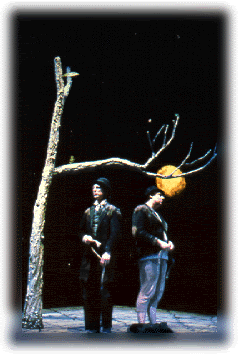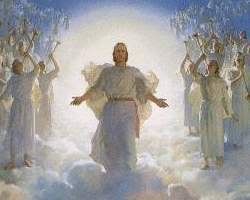
What does the New Year Hold for Metacorck's blog?
peaking into the crusal ball we can see a series on Doherty's Evolution of Jesus
a series on Dennett's Breaking the Spell
More fun in argument!
all cooming soon to a blog near you.
Happy New year!


Quote:Given the existence as uttered forth in the public works of Puncher and Wattmann of a personal God quaquaquaqua with white beard quaquaquaqua outside time without extension who from the heights of divine apathia divine athambia divine aphasia loves us dearly with some exceptions for reasons unknown but time will tell and suffers like the divine Miranda with those who for reasons unknown but time will tell are plunged in torment plunged in fire whose fire flames if that continues and who can doubt it will fire the firmament that is to say blast hell to heaven so blue still and calm so calm with a calm which even though intermittent is better than nothing but not so fast and considering what is more that as a result of the labors left unfinished crowned by the Acacacacademy of Anthropopopometry of Essy-in-Possy of Testew and Cunard it is established beyond all doubt all other doubt than that which clings to the labors of men that as a result of the labors unfinished of Testew and Cunnard it is established as hereinafter but not so fast for reasons unknown that as a result of the public works of Puncher and Wattmann it is established beyond all doubt that in view of the labors of Fartov and Belcher left unfinished for reasons unknown of Testew and Cunard left unfinished it is established what many deny that man in Possy of Testew and Cunard that man in Essy that man in short that man in brief in spite of the strides of alimentation and defecation wastes and pines wastes and pines and concurrently simultaneously what is more for reasons unknown in spite of the strides of physical culture the practice of sports such as tennis football running cycling swimming flying floating riding gliding conating camogie skating tennis of all kinds dying flying sports of all sorts autumn summer winter winter tennis of all kinds hockey of all sorts penicillin and succedanea in a word I resume flying gliding golf over nine and eighteen holes tennis of all sorts in a word for reasons unknown in Feckham Peckham Fulham Clapham namely concurrently simultaneously what is more for reasons unknown but time will tell fades away I resume Fulham Clapham in a word the dead loss per head since the death of Bishop Berkeley being to the tune of one inch four ounce per head approximately by and large more or less to the nearest decimal good measure round figures stark naked in the stockinged feet in Connemara in a word for reasons unknown no matter what matter the facts are there and considering what is more much more grave that in the light of the labors lost of Steinweg and Peterman it appears what is more much more grave that in the light the light the light of the labors lost of Steinweg and Peterman that in the plains in the mountains by the seas by the rivers running water running fire the air is the same and then the earth namely the air and then the earth in the great cold the great dark the air and the earth abode of stones in the great cold alas alas in the year of their Lord six hundred and something the air the earth the sea the earth abode of stones in the great deeps the great cold on sea on land and in the air I resume for reasons unknown in spite of the tennis the facts are there but time will tell I resume alas alas on on in short in fine on on abode of stones who can doubt it I resume but not so fast I resume the skull fading fading fading and concurrently simultaneously what is more for reasons unknown in spite of the tennis on on the beard the flames the tears the stones so blue so calm alas alas on on the skull the skull the skull the skull in Connemara in spite of the tennis the labors abandoned left unfinished graver still abode of stones in a word I resume alas alas abandoned unfinished the skull the skull in Connemara in spite of the tennis the skull alas the stones Cunard (mêlée, final vociferations)
Hbr 1:1 ¶ God, who at sundry times and in divers manners spake in time past unto the fathers by the prophets,
Hbr 1:2 Hath in these last days spoken unto us by [his] Son, whom he hath appointed heir of all things, by whom also he made the worlds;
Hbr 1:3 Who being the brightness of [his] glory, and the express image of his person, and upholding all things by the word of his power, when he had by himself purged our sins, sat down on the right hand of the Majesty on high;
LO:You keep repeating this bit:
"Well, we can show that the basic story that makes up the Pre Markan redaction was used by all four Gospels, and that it was circulating as early as AD 50, that's just 18 years after the original events."
You rely on a single book by a single scholar (Helmut Koester's Ancient Christian Gospels) to establish the existence of a hypothetical document.
The two problems here are, first, that Koester's views are of course contestable, and are contested by a number of scholars, and second, that you inject a large amount of your own interpretation into what Koester (and Petersen) actually say in the book. You really need to take another look at this claim and stop simply repeating it.
This is the kind of thing I meant when I said you should take another look at this claim and stop simply repeating it. First, as I said earlier, Crossan says “the 50’s” not “by 50.” Koester describes Crossan’s position as dating the Cross Gospel to “the middle of the 1st century CE.” You interpret this “middle” to mean by 50 precisely, but “middle” means a range of possible dates in the middle, not the exact middle.
Second, Koester is describing Crossan’s position, not his own. You say Koester never says otherwise. Even if this were the case, it would not mean that he endorses Crossan’s position or that he actually says he dates the Passion Narrative source to 50. But in fact, Koester disagrees with Crossan, and on a lot more than the epiphany stories. After describing Crossan’s theory in the paragraph on pp. 218-219, Koester criticizes it, saying, “There are three major problems regarding this hypothesis.” The second of these major criticisms has to do with Crossan’s early dating of a “major literary composition,” by which Koester means Crossan’s Cross Gospel.
You also jump ahead to p. 131 to cite two sentences about the PN source, where Koester is no longer discussing Crossan’s position. Yes, Koester believes that all the gospels depend on one PN source and that it ends with the empty tomb story. However, he does not say that this PN source was written by 50.
You pull that from the earlier paragraph describing Crossan’ theory on pp. 218-219, though, as I’ve said you misinterpret “middle of the 1st century” to mean specifically the year 50. Crossan’s study is not one of the studies Koester is referring to on p. 131. Crossan’s hypothetical source, the Cross Gospel, did not contain the empty tomb story. Crossan thinks that story was composed later by the author of Mark.
So you are ignoring what Crossan actually says about when he dates his Cross Gospel, you are forcing an overly specific interpretation on Koester’s description of Crossan’s “middle of the 1st century”, and you mistakenly take Koester to be agreeing with Crossan on all but the epiphany stories.

This sceptical way of thinking reached its culmination in the argument that Jesus as a human being never existed at all and is a myth.... But above all, if we apply to the New Testament, as we should, the same sort of criteria as we should apply to other ancient writings containing historical material, we can no more reject Jesus' existence than we can reject the existence of a mass of pagan personages whose reality as historical figures is never questioned. Certainly, there are all those discrepancies between one Gospel and another. But we do not deny that an event ever took place just because some pagan historians such as, for example, Livy and Polybius, happen to have described it in differing terms.... To sum up, modern critical methods fail to support the Christ myth theory. It has 'again and again been answered and annihilated by first rank scholars.' In recent years, 'no serous scholar has ventured to postulate the non historicity of Jesus' or at any rate very few, and they have not succeeded in disposing of the much stronger, indeed very abundant, evidence to the contrary.



Rise Up, O Men of God
Text: William P. Merrill, 1867-1954
Generally sung to FESTAL SONG (SM)
Composed by William H. Walter, 1825-1893
For full text, follow this link.
First of all, this hymn reeks of "this text doesn't apply to me" to the female half of the congregation. Maybe once upon a time it didn't, but an inescapable fact of the English language is that it is changing. Women no longer consider themselves part of "men." And the fact is, especially considering the full context of the hymn text, this hymn never really means to address women. So do we really need to use a hymn that excludes (over) half the congregation?
The complaints lodged by the blogger above provide a fascinating study in the doctrinal myopia of modern egalitarians and the foolishness this condition inflicts upon its victims.
Her criticisms (yup, this blogger’s a woman), are three. Let’s examine them in turn.
First of all, this hymn reeks of “this text doesn’t apply to me” when sung by the female half of the congregation. Why? “… an unescapable [sic] fact of the English language is that it is changing. Women no longer consider themselves part of ‘men.’ ”
First of all, this hymn reeks of “this text doesn’t apply to me” when sung by the female half of the congregation. Why? “… an unescapable [sic] fact of the English language is that it is changing. Women no longer consider themselves part of ‘men.’ ”
This kind of challenge sounded revolutionary and daring back in the Seventies (!), but now it just sounds whiney. The use of the masculine in English to comprehend both male and female is as common as ever, except (perhaps) in some highly rarified departments of English, sociology, and women’s studies in the intolerant corridors of academe.
But, hymns do not need to address everyone. Many of them address only God. Others, like Merril’s, address subsets of the Church, in this case men. As a hymn, this one fits well within the mouths of all Christian women, who by this hymn call on men, whose allegiance is to God, to … well, to rise up and to accomplish a variety of tasks that belong to them to do.
Secondly, the theology is simply terrible. Follow the link and pay particular attention to verses 2 and 3. "[The Church's] strength unequal to her task/rise up and make her great" simply isn't true. The Holy Spirit's power makes the imperfect Church equal to whatever task God calls us to do. It is not the strength of the male half of the church that will make the church great, it is the strength of the Lord Jesus himself.
Third, this hymn reinforces the church's historical error of thinking that men can more fully conform to the image of Christ than women can. Verse 4 is particularly bad about this. Women obviously cannot be "brothers of the Son of Man." And just as we need to not forget that there are men in the body of Christ, we must not forget that there are women in the body, as well. This hymn doesn't forget it, it ignores it.
"Rise Up, O Men of God" is not fit for either full congregational or for men's group singing. I suppose verse 1 is acceptable for the latter, if groups will stop with verse 1. But there are better hymns that express the need for all of us, including all the men, to be faithful disciples of Jesus Christ. It's not especially difficult to find and use them instead.
(EDIT: Thank you to the gender hierarchalist critic who made much of the fact that I typed a "u" instead of an "i" in the word "inescapable." What a terrible, horrible, unforgivable gaffe on my part! My typing error was by far the most supportable of your objections to this blog entry. By the way, I'm going to consider it a typo that you missed one of the "l"s in "Merrill" at several points in your rant against my blog entry. Your toss shattered a wall in your glass house, brother William.
What lies beneath this complaint is nothing other than vexation at the incarnation of the eternal Son of God as a human male. Because of that fact of our faith, it is inescapable that men have a capacity to resemble Christ in ways that women do not. Christ is the Bridegroom, never the bride. He is our brother, never our sister. He is our King, never our queen. He is the Son of God, never the daughter of God. God is Christ’s Father, never Christ’s mother.
When the egalitarian protests that the Church errs by thinking in these terms, we learn from this that it is the egalitarian who knows neither the Scripture, nor the power of God – a power which stamps the human race with a shape, actually two shapes (male and female) which in their relationship to one another mimic the most fundamental relationships of all, that between God and His creation, between Christ and His Church.
And, this is why the Bible, and the Church, and William P. Merril sing “Rise up, O Men of God!” The entire hymn is rooted in the Bible’s ancient sexual polarity, which itself springs from God’s very good design at the beginning of all things, and which moves to the glory of the wedding of the Lamb and His bride at the end of all things.
Hello,
I came across doxa, and your site looks cool. After reading your theodicy
about "soteriological drama," I wanted to ask you: don't you think such a
theodicy renders Christianity completely unfalsifiable - and if it does,
does it bother you at all?
If I understand it, the idea is that God's
existence simply must be in doubt in order for us to most efficiently
internalize moral virtues/rules. As such, your concept of soteriological
drama can be invoked to provide a sort of glib response to ANY
philosophical/scientific/theological objection to Christianity!
The Bible
is full of contradictions? No problem, God put them there because if there
were no contradictions in it, it would be too easy to know that the
Christian God is real, and hence internalization of values would be
hindered.
Evil exists? Of course it does, God needs us to doubt so we can
internalize values.
There are three basic assumptions that are hidden, or perhaps not so obivioius, but nevertheless must be dealt with here.
(1) The assumption that God wants a "moral universe" and that this value outweighs all others.
The idea that God wants a moral universe I take from my basic view of God and morality. Following in the footsteps of Joseph Fletcher (Situation Ethics) I assume that love is the background of the moral universe (this is also an Augustinian view). I also assume that there is a deeply ontological connection between love and Being. Axiomatically, in my view point, love is the basic impitus of Being itself. Thus, it seems reasonable to me that, if morality is an upshot of love, or if love motivates moral behavior, then the creation of a moral universe is essential.
(2) that internal "seeking" leads to greater internalization of values than forced compliance or complainance that would be the result of intimindation.
That's a pretty fair assumption. We all know that people will a lot more to achieve a goal they truely beileve in than one they merely feel forced or obligated to follow but couldn't care less about.
(3)the the drama or the big mystery is the only way to accomplish that end.
The pursuit of the value system becomes a search of the heart for ultaimte meaning,that ensures that people continue to seek it until it has been fully internatlized.
The argument would look like this:
(1)God's purpose in creation: to create a Moral Universe, that is one in which free moral agents willingly choose the Good.
(2) Moral choice requires absolutely that choice be free (thus free will is necessitated).
(3) Allowence of free chioces requires the risk that the chooser will make evil chioces
(4)The possiblity of evil choices is a risk God must run, thus the value of free outweighs all other considerations, since without there would be no moral universe and the purpsoe of creation would be thwarted.
This leaves the atheist in the position of demanding to know why God doesn't just tell everyone that he's there, and that he requires moral behavior, and what that entials. Thus there would be no mystery and people would be much less inclinded to sin.
This is the point where Soteriological Drama figures into it.
Argument on Soteriological Drama:
(5) Life is a "Drama" not for the sake of entertainment, but in the sense that a dramatic tention exists between our ordinary observations of life on a daily basis, and the ultiamte goals, ends and puroses for which we are on this earth.
(6) Clearly God wants us to seek on a level other than the obvious, daily, demonstrative level or he would have made the situation more plain to us
(7) We can assume that the reason for the "big mystery" is the internalization of choices. If God appeared to the world in open objective fashion and laid down the rules, we would probalby all try to follow them, but we would not want to follow them. Thus our obedience would be lip service and not from teh heart.
(8) therefore, God wants a heart felt response which is internatilized value system that comes through the search for existential answers; that search is phenomenological; intetrsubective, internal, not amienable to ordinary demonstrative evidence.
Argument from Non-Belief?; this doesn't pose a problem:
the fact that so many people don't believe in the Christian God gives us the
doubt that is required to efficiently internalize values. Et cetera.
Your
concept of soteriological drama is similar to other christian responses,
like "God is mysterious," and "God needs us to have faith, faith is the
vestibule through which God chooses to deliver salvation:" these responses
work as responses to any sort of objection, and render Christianity
completely unfalsifiable. And if your soteriological drama concept sort of
innoculates Christianity from intellectual attack, is the intellectual
defense of Christianity disingenuous?
If we cleverly innoculate
Christianity such that it's unfalsifible, and any sort of problem in it is
explained (away) through soteriological drama, are we being fair when
debating with atheists? I'd appreciate your thoughts.
Alex